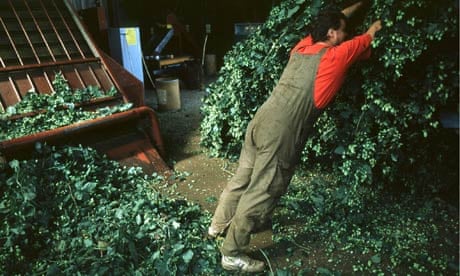Famine. Mass migration. Flash flooding. Sea-level rises. Increased malaria. Heat waves. Rapid species extinctions. The implications of climate change are well documented and much discussed. But, due to a curious cocktail of apathy, denial and ideologically fuelled intransigence, some people still choose to play "see no evil".
Well, maybe this is what it will take to get them to sit up and take notice: climate change is starting to degrade the quality of beer. Or so say a team at the Czech Hydrometeorological Institute lead by the climatologist Martin Mozny. The team has just published a study in Agricultural and Forest Meteorology which concludes that "even with the modest warming so far experienced, [hop] yields [in the Czech Republic] have stagnated and quality declined".
Yields have already been affected as air temperatures have slowly risen over the previous five decades, say the scientists, and they predict that future warming could reduce yields by a further 7-10%.
But it is the decline in quality of the Saaz hops, which produce the famous Czech pilsners, that is perhaps most worrying for beer lovers. The "Alpha" acid content – "a major determinant of quality", according to the team, as it's the compound that produces a pilsner's defining bitter taste – is likely to fall a further 13–32% if the predicted warming occurs. The study found that the concentration of these acids has fallen by 0.06% a year since 1954.
It's not the first time that climatologists have expressed concern about the impact of climate change on beer production (hmm ... I wonder why they choose the quality and output of beer as subjects worthy of detailed examination?). In 2008, a researcher at the National Institute of Water and Atmospheric Research in New Zealand told a conference of beer industry representatives that rising temperatures may threaten beer production. That time it was malting barley that was identified as being particularly vulnerable to rising temperatures. The researcher, Jim Salinger, concluded:
It will mean either there will be pubs without beer, or the cost of beer will go up.
If that sentence doesn't sharpen the focus on the climate change debate, frankly, I don't know what will.

Comments (…)
Sign in or create your Guardian account to join the discussion